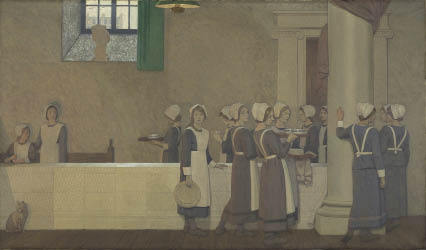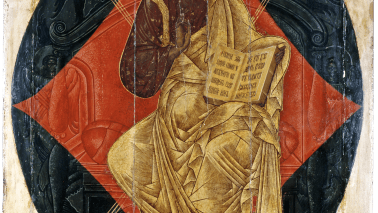Frederick Cayley Robinson: Acts of Mercy
National Gallery, until 17 October
The free exhibitions in the Sunley Room offer a programme of meditations on the National Gallery’s permanent collection, either through works of art directly inspired by or related to the old masters, or connected in a more oblique way. Frederick Cayley Robinson (1862–1927) is a little-known early-20th-century English painter in oils, tempera and watercolour who deserves wider recognition: this loan exhibition is the first show of his work for more than 30 years.
A traditionalist with a feeling for the more modern statement, Cayley Robinson was using the same methods and materials as the old masters, but wanted to create something of relevance to his period. His acknowledged masterpiece is a series of four large paintings commissioned in 1912 by Sir Edmund Davis for the Middlesex Hospital, of which he was a governor and benefactor. These hung in the hospital’s entrance hall until its demolition in 2007, and were subsequently bought by the Wellcome Library and now form part of the Wellcome Collection in Euston Road. They are currently the centrepiece of the NG’s Cayley Robinson display.
The four pictures make an extraordinary set of images embodying the mission of the hospital, and deal with the Seven Corporal Works (or Acts) of Mercy: feeding the hungry, giving drink to the thirsty, clothing the naked, giving shelter to the homeless, visiting the imprisoned, attending the sick and burying the dead. All are featured or implied in the paintings, which are arranged in two pairs: ‘Orphans’, and ‘The Doctor’. The ‘Orphans’ were painted to be shown next to each other and read sequentially, ‘The Doctor’ to be seen facing each other. Why then hang the two panels of ‘The Doctor’ at right angles? Apart from this solecism, the paintings look immensely impressive and repay time spent in their company.








Comments
Join the debate for just £1 a month
Be part of the conversation with other Spectator readers by getting your first three months for £3.
UNLOCK ACCESS Just £1 a monthAlready a subscriber? Log in